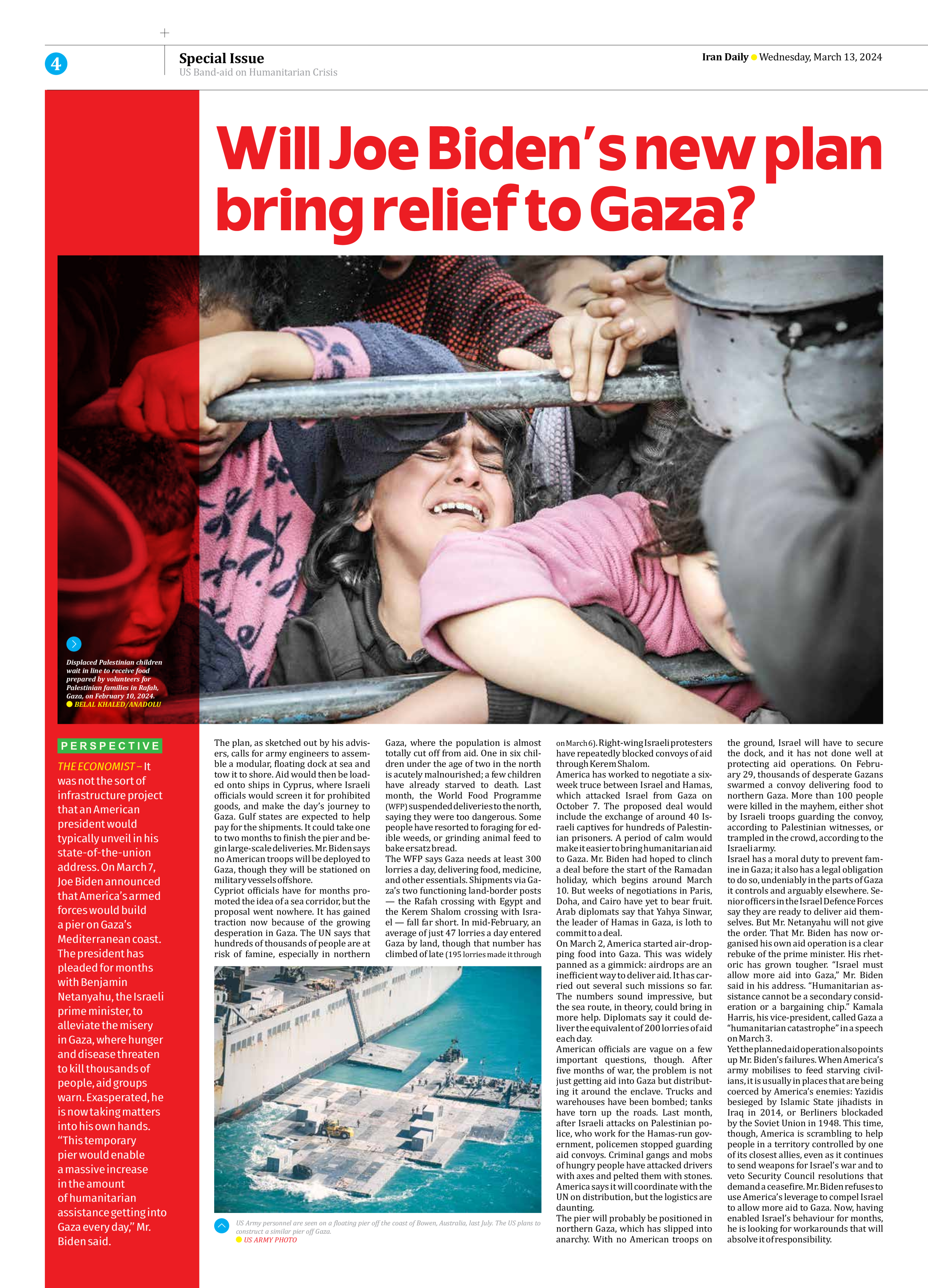
Will Joe Biden’s new plan bring relief to Gaza?
THE ECONOMIST – It was not the sort of infrastructure project that an American president would typically unveil in his state-of-the-union address. On March 7, Joe Biden announced that America’s armed forces would build a pier on Gaza’s Mediterranean coast. The president has pleaded for months with Benjamin Netanyahu, the Israeli prime minister, to alleviate the misery in Gaza, where hunger and disease threaten to kill thousands of people, aid groups warn. Exasperated, he is now taking matters into his own hands. “This temporary pier would enable a massive increase in the amount of humanitarian assistance getting into Gaza every day,” Mr. Biden said.
The plan, as sketched out by his advisers, calls for army engineers to assemble a modular, floating dock at sea and tow it to shore. Aid would then be loaded onto ships in Cyprus, where Israeli officials would screen it for prohibited goods, and make the day’s journey to Gaza. Gulf states are expected to help pay for the shipments. It could take one to two months to finish the pier and begin large-scale deliveries. Mr. Biden says no American troops will be deployed to Gaza, though they will be stationed on military vessels offshore.
Cypriot officials have for months promoted the idea of a sea corridor, but the proposal went nowhere. It has gained traction now because of the growing desperation in Gaza. The UN says that hundreds of thousands of people are at risk of famine, especially in northern Gaza, where the population is almost totally cut off from aid. One in six children under the age of two in the north is acutely malnourished; a few children have already starved to death. Last month, the World Food Programme (WFP) suspended deliveries to the north, saying they were too dangerous. Some people have resorted to foraging for edible weeds, or grinding animal feed to bake ersatz bread.
The WFP says Gaza needs at least 300 lorries a day, delivering food, medicine, and other essentials. Shipments via Gaza’s two functioning land-border posts — the Rafah crossing with Egypt and the Kerem Shalom crossing with Israel — fall far short. In mid-February, an average of just 47 lorries a day entered Gaza by land, though that number has climbed of late (195 lorries made it through on March 6). Right-wing Israeli protesters have repeatedly blocked convoys of aid through Kerem Shalom.
America has worked to negotiate a six-week truce between Israel and Hamas, which attacked Israel from Gaza on October 7. The proposed deal would include the exchange of around 40 Israeli captives for hundreds of Palestinian prisoners. A period of calm would make it easier to bring humanitarian aid to Gaza. Mr. Biden had hoped to clinch a deal before the start of the Ramadan holiday, which begins around March 10. But weeks of negotiations in Paris, Doha, and Cairo have yet to bear fruit. Arab diplomats say that Yahya Sinwar, the leader of Hamas in Gaza, is loth to commit to a deal.
On March 2, America started air-dropping food into Gaza. This was widely panned as a gimmick: airdrops are an inefficient way to deliver aid. It has carried out several such missions so far. The numbers sound impressive, but the sea route, in theory, could bring in more help. Diplomats say it could deliver the equivalent of 200 lorries of aid each day.
American officials are vague on a few important questions, though. After five months of war, the problem is not just getting aid into Gaza but distributing it around the enclave. Trucks and warehouses have been bombed; tanks have torn up the roads. Last month, after Israeli attacks on Palestinian police, who work for the Hamas-run government, policemen stopped guarding aid convoys. Criminal gangs and mobs of hungry people have attacked drivers with axes and pelted them with stones. America says it will coordinate with the UN on distribution, but the logistics are daunting.
The pier will probably be positioned in northern Gaza, which has slipped into anarchy. With no American troops on the ground, Israel will have to secure the dock, and it has not done well at protecting aid operations. On February 29, thousands of desperate Gazans swarmed a convoy delivering food to northern Gaza. More than 100 people were killed in the mayhem, either shot by Israeli troops guarding the convoy, according to Palestinian witnesses, or trampled in the crowd, according to the Israeli army.
Israel has a moral duty to prevent famine in Gaza; it also has a legal obligation to do so, undeniably in the parts of Gaza it controls and arguably elsewhere. Senior officers in the Israel Defence Forces say they are ready to deliver aid themselves. But Mr. Netanyahu will not give the order. That Mr. Biden has now organised his own aid operation is a clear rebuke of the prime minister. His rhetoric has grown tougher. “Israel must allow more aid into Gaza,” Mr. Biden said in his address. “Humanitarian assistance cannot be a secondary consideration or a bargaining chip.” Kamala Harris, his vice-president, called Gaza a “humanitarian catastrophe” in a speech on March 3.
Yet the planned aid operation also points up Mr. Biden’s failures. When America’s army mobilises to feed starving civilians, it is usually in places that are being coerced by America’s enemies: Yazidis besieged by Islamic State jihadists in Iraq in 2014, or Berliners blockaded by the Soviet Union in 1948. This time, though, America is scrambling to help people in a territory controlled by one of its closest allies, even as it continues to send weapons for Israel’s war and to veto Security Council resolutions that demand a ceasefire. Mr. Biden refuses to use America’s leverage to compel Israel to allow more aid to Gaza. Now, having enabled Israel’s behaviour for months, he is looking for workarounds that will absolve it of responsibility.







